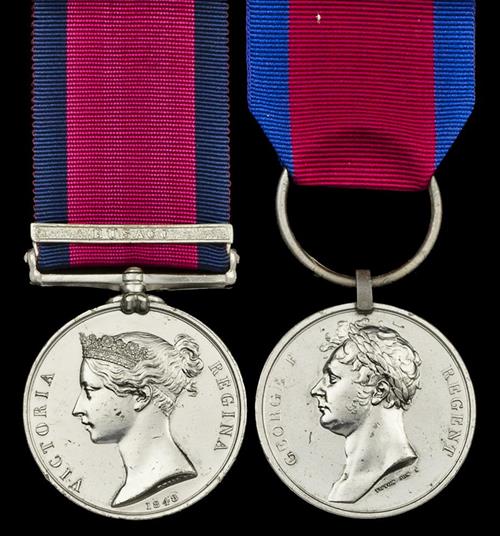
Auction: 16001 - Orders, Decorations, Campaign Medals and Militaria
Lot: 168
The Outstanding Peninsula and Waterloo Pair to Lieutenant W. Chapman, 95th Foot, Late Captain, 1st Cacadores, Portuguese Service. Wounded at Redinha, 12.3.1811, and at Quatre Bras, 16.6.1815, He Recovered in Time to Take Part in the Battle of Waterloo, 18.6.1815: 'It was Indeed a Glorious Day for England, our Duke, and We Humble Instruments. I Would Not Have Missed Being in the Battle for Thousands'
Military General Service 1793-1814, one clasp, Busaco (W. Chapman, Lieut. 95th. Foot.); Waterloo 1815 (Lieut. William Chapman, Rifle Brigade, 1st. Batt.), with original steel clip and split ring suspension, minor edge nicks, good very fine (2)
Lieutenant William Chapman was born in 1775 and was appointed an Ensign in the Leicester Militia in March 1806, being promoted Lieutenant in April 1807. Volunteering along with 125 men from the Leicester Militia, he was Commissioned Second Lieutenant, 95th Foot (Rifle Brigade) in April 1809: 'We reached Hastings the same night where we found that the volunteering of the Leicester Militia (who were quartered there) had commenced, and that one hundred and twenty-five men and two officers had given their names to the 7th Fusiliers, and these Adams and I determined to make change their minds in our favour if we could. The appearance of our Rifle uniform, and a little of Sergeant Adams' blarney, so took the fancy of the volunteers, that we got everyone of them for the Rifle Corps, and both officers into the bargain. The names of these two officers were Chapman and Freere.' (Recollections of Rifleman Harris refers).
Chapman was promoted Lieutenant in March 1810, he fought with the 95th Foot at the Battle of Busaco, 27.9.1810, before being appointed to the Portuguese Service, as a Captain in the 1st Cacadores, in February 1811. Wounded during the action with the French at Redinha, 12.3.1811, he left the Portuguese Service in February 1812 and returned to his old unit.
Chapman served during the Waterloo Campaign with the 1st Battalion, as part of Captain W. Johnston's No.5 Company- a letter written to his mother shortly before the Battle states: 'Marshal Ney is at a little distance, twelve miles, and lots of troops following him. And my Lord the Duke of Wellington is at Brussels, leaving garrisons in the strong places. It is a rich, beautiful country, so that we shall not suffer as we did in Portugal and Spain. The poor old King of France passed through here a few days since; when the troops hurrahed he was much affected, and said it was the second time he sought an asylum amongst us. Several of his followers have since passed. Although all the inhabitants are in favour of the old King, yet the soldiers are for Boney, so that war is, I think, certain. The English papers seem to believe that things may be settled; I think it impossible without beating him. I have much to do here, but will write you as often as I well can, but should you not hear, always hope for the best.' (Atherstone News, 18.6.1915 refers).
Chapman was wounded at the Battle of Quatre Bras, 16.6.1815, but evidently was fit enough to take part in the Battle of Waterloo, according to a letter written to his brother: 'Camp near St. Denis (two leagues from Paris), 5th July 1815. My dear Sam, your affectionate letter of the 15th June I did not get until yesterday, and a joyful day for us it was, for hostilities ceased. Our great Duke has gotten from the enemy (we hear) all he asked, and I suppose a few days will suffice to settle all things so that we can ride into Paris. We had a long hard battle on the 18th; all other battles are foolish things when compared with it. The enemy doubled our number; he left on the field twenty-one thousand killed and wounded, twenty-two thousand prisoners. I have no doubt of his losing more men that day than we had in the field; one whole division of our Army was not in the fight. It was indeed a glorious day for poor old England, our Duke, and we humble instruments. I would not have missed being in the battle for thousands; it shall wind up my fighting. I told mother that all the injury I received was a ball through my cap; it just cut my head.' (ibid).
Retiring as a 'consequence of wounds' in April 1819, he died at Leamington, Warwickshire in February 1854.
Single Clasp 'Busaco' unique to an Officer in the 95th Foot.
Subject to 20% VAT on Buyer’s Premium. For more information please view Terms and Conditions for Buyers.
Sold for
£8,000




